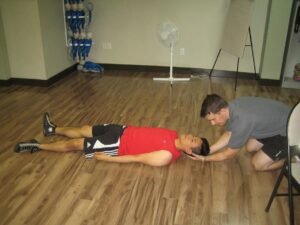Concussion: First Aid Recognition, Brain Safety, and Injury Prevention in Canada
A concussion is a common form of traumatic brain injury (TBI) caused by a blow or jolt to the head or body that causes the brain to move rapidly inside the skull. Concussions can result from both minor and severe impacts, and they are not always immediately obvious.
From a first aid, CPR, and workplace safety perspective, concussions are especially important because symptoms may appear subtle at first, yet the injury can have serious short- and long-term effects, particularly when head injuries are repeated or ignored.
This article is provided for education and safety awareness only and does not replace medical advice.
Why Concussions Matter for First Aid and Safety
Concussions are a major concern in:
-
Sports and recreational activities
-
Workplaces with fall or impact risks
-
Motor vehicle collisions
-
Winter activities such as skiing and snowboarding
Even when a head injury seems mild, the brain can be significantly affected. Research shows that concussion temporarily disrupts normal brain function—sometimes comparable to patterns seen in more severe brain injuries.
Returning to activity too soon greatly increases the risk of permanent brain damage.
What Happens During a Concussion?
A concussion occurs when rapid movement causes the brain to shift or twist inside the skull. This sudden motion:
-
Disrupts brain cell communication
-
Triggers abnormal electrical activity
-
Impairs memory, balance, and thinking
Unlike cuts or fractures, concussions often have no visible signs, which is why first aid awareness is critical.
Signs and Symptoms of a Concussion
Early (Immediate) Symptoms
These may appear right after the injury or within minutes:
-
Disorientation
-
Confusion
-
Memory loss (before or after the injury)
-
Dizziness or balance problems
-
Headache
-
Nausea or vomiting
-
Ringing in the ears (tinnitus)
-
Unequal pupil size
-
Visual disturbances
-
Loss of consciousness (not always present)
Delayed (Late) Symptoms
These may develop hours or days later:
-
Difficulty concentrating
-
Memory problems
-
Sleep disturbances
-
Fatigue
-
Irritability
-
Mood or personality changes
Because delayed symptoms are common, ongoing monitoring is essential after any head injury.
High-Risk Activities: Skiing and Snowboarding
In Canada, concussions and other traumatic brain injuries are increasingly reported among skiers and snowboarders.
Contributing factors include:
-
Higher speeds
-
Jumping and aerial tricks
-
Collisions with obstacles or other riders
Helmet use significantly reduces the risk of head injury and is strongly recommended for winter sports participants of all ages.
First Aid Response: What to Do Immediately

If a concussion is suspected:
-
Stop the activity immediately
-
Do not allow the person to return to play or work
-
Keep the person under observation
-
Seek medical assessment as soon as possible
Even if symptoms improve quickly, the brain still needs time to heal.
Why “Playing Through It” Is Dangerous
One of the greatest risks with concussion is returning to activity too soon.
-
Symptoms such as confusion or disorientation may fade within minutes
-
The brain may still be vulnerable to further injury
-
A second concussion before recovery can lead to severe brain damage
This is why any suspected concussion requires removal from activity and medical clearance before returning.
Determining When It’s Safe to Return
Deciding when a person can safely return to work, sport, or physical activity should be guided by a healthcare professional.
Modern concussion management emphasizes:
-
Gradual return to activity
-
Symptom monitoring
-
Cognitive and physical rest
First aiders should never make return-to-play or return-to-work decisions on their own.
Workplace and Community Safety Considerations
Concussions can affect:
-
Reaction time
-
Judgment
-
Memory
-
Balance
These impairments increase the risk of secondary injuries, especially in safety-sensitive roles. Employers and organizations should support:
-
Early reporting of head injuries
-
Medical assessment and clearance
-
Modified duties during recovery
Key Takeaways for Canadians
-
Concussions can occur even with minor impacts
-
Symptoms may be delayed or subtle
-
Repeated concussions increase long-term risk
-
Immediate removal from activity is essential
-
Helmets reduce—but do not eliminate—risk
Educational Disclaimer
This article is provided for general education and first aid awareness only. It does not diagnose or treat concussions. Anyone with a suspected head injury should seek professional medical care promptly.
